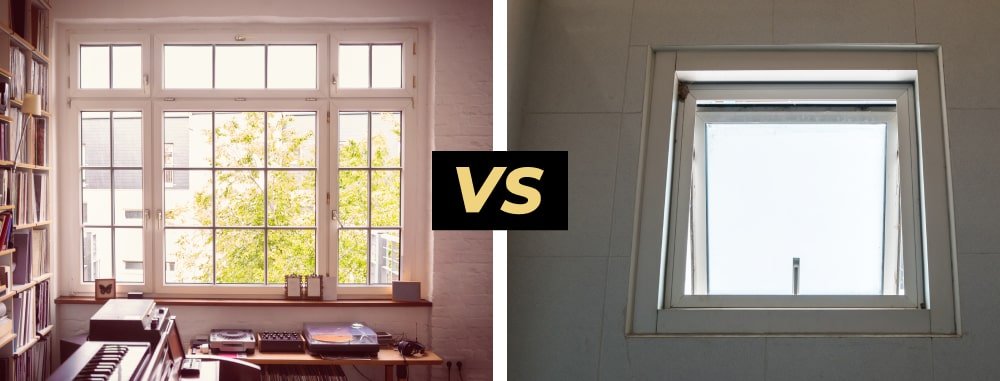
Casement vs Single-Hung Windows
Aesthetic appeal as well as utility depend on your home's window design choice. Among the most often used windows are single-hung and casement ones. Both have special advantages and match various kinds of dwellings and purposes. By considering their configurations, materials, pricing variations, and advantages and downsides, we will contrast these two window types in this blog article so you may choose which best fits your house.
Key Takeaways
- Single-hung windows include a vertically movable sash; casement windows open outward like a door.
- Casement windows open completely, unlike single-hung windows where just one sash opens, therefore offering more ventilation.
- Maintenance: Because single-hung windows have less moving components than casement windows, they usually require less care; still, sometimes their cranks and hinges should be checked.
Casement Window Definition
Usually by hand crank, casement windows open outward from one side. This construction lets the whole window open, therefore optimizing airflow and providing an unhindered view. Areas like kitchens or living rooms where maximum ventilation is wanted sometimes use these windows. The width of the aperture needed will determine whether single or double casement windows are desired. To get further information about casement windows and their combinations, visit our casement window page.
Single Hung Window Definition
Traditionally, single-hung windows—which have two sashes—an upper and a lower one—had But just the bottom sash slides vertically; the top sash stays in place. Since the window does not protrude outward or inward, they are a reasonably affordable choice especially for places with limited space. Often seen in older homes, they are prized for their simplicity and classic appeal. For more details on single-hanging window setups, read our single-hung window guide.
Materials Used for Casement & Single Hung Windows
Both casement and single-hung windows of Big City Windows are built out of PVC, and polyvinyl chloride. For numerous reasons, PVC is a common choice used in window production. It is first quite durable, resisting over time corrosion and weather damage. Second, PVC windows provide outstanding insulation, which keeps heat inside during the winter and out during the summer helping to save energy expenditures.
For house owners looking for premium windows without breaking the budget, PVC is also reasonably priced compared to materials like wood or aluminum.
Moreover, PVC is flexible and can be formed into different designs, therefore enabling variation in window forms. For homeowners seeking long-term durability with low care, this material also fits rather well as it takes little upkeep.
Cost Differences of Casement vs Single-Hung Windows
When it comes to expenses, casement and single-hung windows differ noticeably. Because of its intricate design—which includes cranks, hinges, and seals that help to ensure their smooth functioning and improved insulation—casement windows sometimes have higher cost. Conversely, single-hung windows are usually more reasonably priced because of its simpler mechanism—that which consists of less moving components and parts.
Installation expenses might also change. Given their specialized hardware, casement windows might demand more time and effort to install; single-hung windows are easier and quicker to install. This thorough information on window replacement costs will help you to better understand the pricing variations between these two window designs.
Casement Window Pros
- Excellent Ventilation: Unlike single-hung windows, where just one sash may open, casement windows open completely and offer better ventilation. In rooms requiring additional ventilation especially this is helpful.
- Better Energy Efficiency: Casement windows seal well when closed, so they use less energy than single-hung windows. This close seal enhances insulation and stops drafts, therefore saving homeowners' energy costs.
- Unobstructed Views: Casement windows are an excellent choice for areas with scenic views or natural surroundings since they provide an unbroken view without separating sash.
Casement Window Cons
More Expensive: Casement windows' more complicated mechanism and design mean they are usually more expensive. Over time, their energy efficiency might, however, balance the original cost, therefore saving on heating and cooling expenses. Moreover, single hung windows' economy may help homeowners who give budget-friendly choices first priority without compromising quality.
Single Hung Window Pros
- Cost-Effective: Usually more reasonably priced than casement windows, single-hung windows are an excellent option for budget-conscious homeowners wishing to update.
- Space-Saving Design: For spaces with limited space, such patios or pathways, where an outward-opening window could get in the way, single-hung windows slide vertically rather than outward.
- Low Maintenance: Single-hung windows often require less maintenance than casement windows given less moving components. Their straightforward construction reduces the number of parts that over time could wear out or call for maintenance.
Single Hung Window Cons
Unlike casement windows that open completely, single-hung windows only let the bottom sash move, therefore restricting the airflow. For homes that don't give optimum ventilation top priority, however, the simplicity and price of single-hung windows usually make this trade-off reasonable.
Casement vs Single Hung Windows: Conclusion
Each window type is appropriate for different uses and tastes as both casement and single-hung windows have unique benefits and some limitations. Though they cost more, casement windows provide improved ventilation, unhindered vistas, and great energy efficiency. Conversely, single-hung windows are a low-maintenance, reasonably priced solution that saves space; yet, their restricted ventilation might not be appropriate for every application.
Casement windows can be the finest option for you if you search for windows that maximize ventilation and energy economy. Single hung windows are a great choice, but, if you would want a more affordable solution that is simpler to maintain and does not call for more room. Customizing both choices with premium PVC materials guarantees life and durability for your house.
For more information about window styles and replacement costs, check out Big City Windows’ full guides on casement windows, single hung windows, and window replacement costs.
Examining the advantages and drawbacks of every type will help you to select the window that best suits your design taste, financial situation, and practical requirements for your house.






